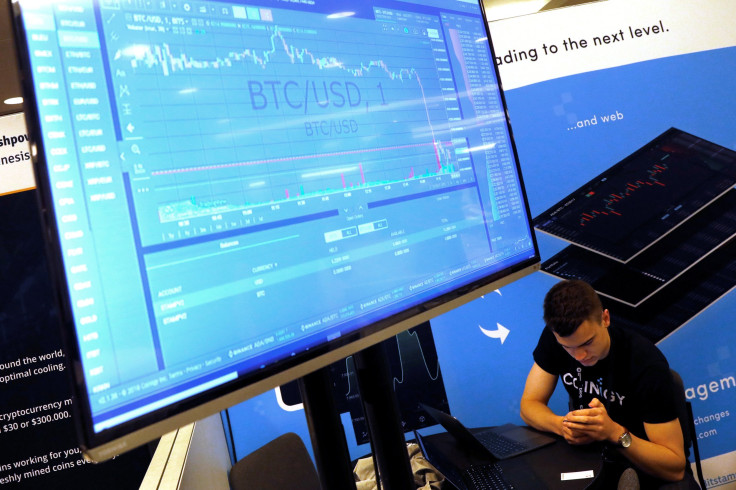It's Time We Got Real About Blockchain Technology

Last year, cryptocurrencies were virtually unstoppable. When the clock struck midnight on 2017, the aggregate value of virtual currencies had soared by almost $600 billion, or more than 3,300%, when all was said and done. It's probably the single greatest year we've ever witnessed for any asset class.
While there were a number of catalysts behind this rally, including a weakening U.S. dollar and retail investors controlling a majority of the trading action in cryptocurrencies, it's the emergence of blockchain technology that's been hands-down the key driver for digital currencies.
This article originally appeared in the Motley Fool.
What's Blockchain, And why's Everyone So Excited About It?
What's blockchain, you ask? Officially, it's the digital, distributed, and decentralized ledger underlying most virtual currencies that's responsible for processing transactions without the need for a financial intermediary, like a bank. In layman's terms, it's a brand-new way of processing transactions without using traditional banking networks. It's also a way of storing and logging data in a transparent but immutable (i.e., unchanging) manner. This pretty much means that blockchain has currency and noncurrency applications.
There are, in particular, four primary advantages that blockchain brings to the table.
First, as noted, this is a decentralized platform. This simply means that instead of storing information in one central location, transaction data is stored on computers all over the globe. Doing so ensures that no single entity, including businesses or cybercriminals, can gain control over a network.
Second, blockchain allows data to be stored securely. Network operators have the option to make blockchain data transparent, so everyone can see it, or restricted, so that only select company employees, as an example, can view it. And because it's immutable, this data cannot be altered. If by some chance it has been altered, the transparency of the network would make it virtually impossible for a hacker to succeed without someone noticing. Ergo, it's considered to be a major step up in security.
Third, since blockchain works around traditional banking networks, it removes banks from the equation as third-party providers. When processing a transaction, banks can collect fees by allowing that transaction to occur on their network. However, without bank involvement, transaction fees may actually decline.
Finally, and perhaps most intriguingly, blockchain offers the potential to process transactions considerably faster than today's banking networks. Today's networks can hold cross-border payments for up to five business days while being validated. With blockchain, transactions may be validated and settled as accurate within a matter of seconds.
There has been no shortage of partnerships backing up these advantages. Dow-component IBM (NYSE:IBM) is arguably leading the charge on blockchain acceptance. IBM is pioneering a project at a dozen major banks in the South Pacific that's aiming to expedite transaction settlement over its proprietary blockchain network. This project involves using Stellar's Lumens coin as an intermediary currency to speed up settlement times on cross-border money flows.
Additionally, IBM and global shipping giant Maersk announced a joint venture earlier this year that'll see a spun-off company devoted to creating blockchain-based shipping solutions. Removing paper from the equation could drastically improve supply chain efficiency for the shipping industry.
It's Time To Face The Facts
On the surface, blockchain has all the hallmarks of being the next great technological revolution. It could allow businesses to more effectively move money, as well as give companies the ability to track supply chains in real time. The possibilities are constrained only by the imaginations of business executives.
Unfortunately, if we face the facts, it's also a technology that's probably years away from being relevant.
First, and perhaps the biggest issue facing blockchain technology, is the proof-of-concept conundrum. In numerous pilot tests and small-scale projects, blockchain has met or exceeded expectations with flying colors. The problem is that the real world doesn't work within the confines of a test, and enterprises haven't been willing to take the training wheels off blockchain just yet. The concern is this: No businesses will fully commit to blockchain since its scalability hasn't been proven -- yet its scalability can't be demonstrated if businesses won't give the technology a chance.
It's probably going to take years before blockchain has any chance of gaining the trust of the business community. If we look back at all other game-changing technologies, such as 3D printing, decoding the human genome, and even the internet, none were immediate hits. Sure, all stocks associated with these trends flew out of the gate initially, but they also came crashing back to earth not long thereafter. Blockchain will take time to prove itself, and that's something investors and businesses need to be aware of.
Second, it's important to realize that integrating blockchain won't be seamless for all industries. Whereas the banking industry could immediately benefit from quicker processing and validating times, other industries would have to completely remove their existing infrastructure in order to incorporate blockchain. That's both time-consuming and expensive.
Finally, and building on this previous point, blockchain isn't necessarily a fit for all industries. Even if blockchain would add some sort of value to certain industries, the time and effort to incorporate it into the fold simply may not be worth it -- especially as long as the technology remains untested in the real world.
In other words, while blockchain does offer game-changing benefits, it's also a work in progress. Resolving these issues isn't going to happen overnight, and no amount of blockchain partnerships between brand-name companies and cryptocurrencies is going to change that. Smart investors are going to stick to the sidelines and wait for this technology to mature before they dare dip their toes into the water.
Sean Williams has no position in any of the stocks or crpytocurrencies mentioned. The Motley Fool is short shares of IBM, but has no position in any cryptocurrencies mentioned. The Motley Fool has a disclosure policy.











